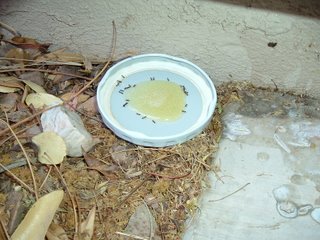Yesterday I turned up an article about
pesticide use affecting male body part size, and not in a good way, so you'd think there would be more opposition to pesticide use than there is.
Anyway, there was a sentence in there that caught my eye:
Delivering a special series of lectures this week at the University of Western Ontario, Louis Guillette [the associate dean for research at the University of Florida] has been drawn into London's lawn-care debate during question periods and talk-show interviews.
London's lawn-care debate?
Today I looked into it, and it turns out that London, Ontario is working on banning pesticides for cosmetic use, which would mean no herbicides, insecticides, or fungicides on lawns. As you would imagine, golf courses and lawn-care companies are opposing the proposed ban.
So this is a big deal, with court battles and picketers and
hundreds of emails, right?
Well, hundreds of emails, anyway. If you look a little harder, it turns out that a committee of the House of Commons looked into
banning lawn chemicals all across Canada in 2002 but couldn't legally pull it off. Since then, multiple cities have gone ahead with bans of their own, including
Toronto, which is only about 120 miles (200 km) away from London, and where they have managed to deal with golf courses and lawn companies without
too much kicking and screaming. So as much as banning lawn-care chemicals that reduce penis size sounds like it would surely generate discussion of another constitutional amendment here in the US of A, where God meant us to have
perfect, bright green lawns no matter what, it sounds almost like a foregone conclusion in London.
In other news, May 1 was the 28th anniversary of the
invention of spam. In 1978, a marketer from DEC did a moderately incompetent job of using SNDMSG (an email program) on Arpanet (the government-run version of today's internet) to advertise their nifty new computer system. Not that this comes as much of a shock in this day and age, but people didn't like it.




